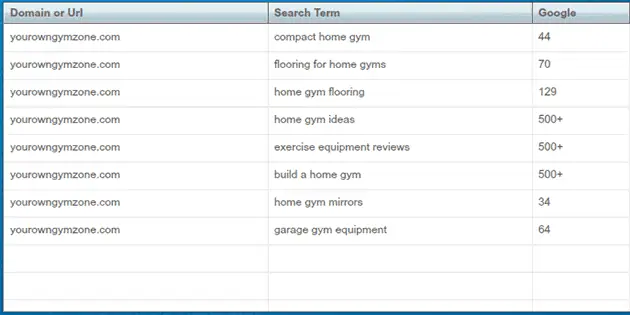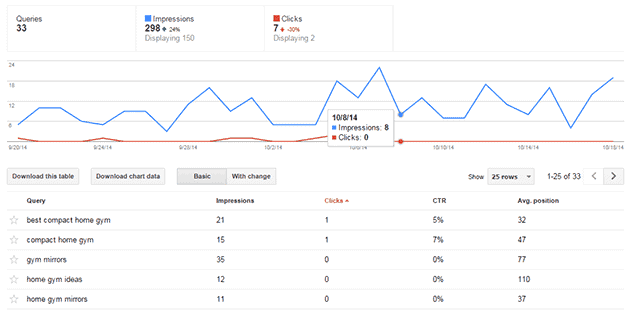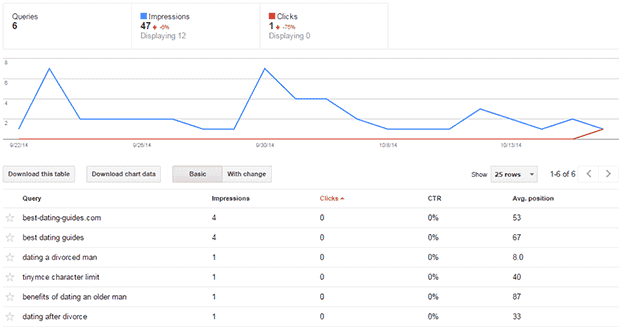I've been wanting to start a new case study for a while now. Things with Genevieve in my previous study have stalled lately as she's got some things going on in her personal life that have made it difficult for her.
We were making great progress and I'm sure she'll be able to return in the future and get that site working properly.
In the meantime though, I really want to get my teeth into a new study and for a few weeks have been uhmming and ahhing about the best approach.
I've already written this 10,000 word guide to setting up a niche site, so I felt that starting a brand new site from scratch would mean repeating myself a bit. I therefore thought that maybe I should go for something different here, like building a site on an expired domain, or building a site without any link building, or experimenting with different traffic methods.
The problem is, there are better people than me who have recently done those (or have ones in progress), so it just makes more sense for me not to go down the same path.
In the end, it was pretty obvious what I should do:
Take one of my existing ready-made sites, and show you exactly how to get success with it.
This was very clear to me as being the best thing to do, for so many reasons.
1.) It lets me demonstrate that my sites work. Great for me and you.
2.) It shows you how to move forward with a site if you buy one.
3.) Because the sites are already made, I can skip the “Keyword research” and “Setting up the site” stages. This means we can get straight into the meat of the study, ranking and monetizing.
4.) Most importantly of all, you get to benefit from seeing exactly how a niche site moves forward, using the most common methods.
While I was thinking about this, I decided to add a little more to the experiment, and take on TWO niche sites.
Why Two Niche Sites?
This makes a lot of sense as well. Every site is different and can get slightly different results. Running an experiment on two sites simultaneously will let you see how results can be different for one site and another, or even different niches.
It will also undoubtedly force me to try different strategies, thus letting you get a bigger idea of things you can try with your own sites.
My initial concern was that I wouldn't have the time to run two sites at the same time (with a huge focus on them because of the case study), while also running HumanProofDesigns and the rest of my business. However, since the sites are already set up and ready to go, I'll be able to outsource and use my team a lot of the time.
This will really help me keep things moving along.
In the end, the pros of running two sites at once far outweigh the cons. If I just worked on one site, there'd be a lot of questions.
What if the first site got lucky and over performed? It would set unrealistic expectations for the rest of you.
What if it under performed and made it look like my training and sites don't work?
Having that second site as a comparison will act validation and verification for the first site, and also doubles the data available. That's gold in this business.
Again, this is going to benefit you as much as me, so the more sites I can showcase, the better.
Before you forget, subscribe to my newsletter (opens in new tab) to stay up to date with this case study.
The Strategy
There's all sorts of talk going on right now about niche site strategy. People are arguing over whether or not PBNs still work, and whether or not they are the best strategy. I'm not going to use PBNs here, but I also am not fully sold on the idea that an authority site with zero link building is the way to go.
I believe niche sites still work, but they require a different approach to keyword research, content, and link building. This is another reason I'm using two sites; I get to really figure this out.
Panda 4.0 and Penguin 3.0 have just rolled out as well, so there is probably going to be a bit of volatility in the search results initially. Luckily I'm working on sites that have been indexed for some time. The content was added in late August (about 6 weeks ago) and the domains are even older.
Using my experience
Based on everything I've learned online, I've come to one conclusion:
A lot of people don't know what they're talking about.
I've seen people scolding others for using backlinks because “they don't work”. Uhmm ok.
I've also seen people reciting strategies that work, when they've not used them. I think perhaps we've all been guilty of reading something, then reciting it as fact.
I'm going to be putting together a strategy based on everything I've seen that has worked, and figuring it out from there.
Over the last two years, here's what's worked for me.
- Simply writing, writing, and writing (and sharing on social media), without worrying about backlinks. This has failed for me as often as it's succeeded though.
- Reaching out to others for links and social shares. Nothing gets your ranking to move positively as well as a solid link does.
- Guest posting. Really depends on where you are posting, but never fails to boost ranking over time.
- Manually adding some base backlinks.
- Link bait.
I will be doing a mixture of the five, but not in the order they're listed above.
Writing
As much as I'd love to just write, write, and write for these two sites, realistically I just don't have the time. It could take 6 months for me to start to get a sniff of ranking, and the rest of my business would suffer.
On top of that, you really have no way of telling whether or not a site is going to succeed initially. I honestly think it makes more sense to test a niche by doing keyword research, building out the basic content, doing some link building, and seeing where you get to. If the site shows potential, THEN go on to building it out into a big site.
Don't waste your time adding 50-100 pieces of content unless you really want to commit to the site.
Therefore, I will add some new content to the sites to freshen things up, target new keywords, and grow them, but I will probably stop at 10 new articles each for now.
I will probably add 10 articles each, 1 article per week.
Outreach
Nothing works better than outreach for getting natural links to your site, and a fresh audience. If you can connect with some popular people in your niche and get a few links from them, you're going to get traffic, and you're going to get highly valuable links as well.
This is the only method I use at HPD for increasing rankings (apart from writing the blog), and it works well. It's definitely a long-term play though, and if you're going to use it as your sole method, make sure you're working on an authority site that can be grown out.
For a niche site, this method works, but you can't spend a lot of time on it initially, in case things don't pan out.
Guest Posting
Guest posting works best when you can connect with good sites in your niche, just look the outreach method. I'll definitely try to connect with a few people in both niches and try to land a few guest post gigs. This will expose my sites to new audiences, and get a few decent backlinks as well.
Guest posting has got a bad reputation recently, but if you do it right, only approach high quality sites, and don't focus solely on it, there's no reason to think guest posts don't work. They're fantastic.
In fact, when you consider that Google wants you to get high quality links that require moderation (outreach and guest post links), it's even more worthwhile.
Manually Added Links
I'm NOT going to be using PBN links for these sites or worrying about things like mass linking and submissions. However, I do think that some well-placed manual link building can work well.
When a site is new and being indexed, a few safe links can help it get that initial bump up the rankings, and from there, the previous three methods I talked about will be much more effective.
If you're interested to know what kind of links I'm talking about, you can view Jon Cooper's article here, or go further and buy his eBook, which I'll also be referencing. It's one of the most tried and tested (and long lasting) guides out there.
Link Bait And Wow Posts
As well as the other four methods, I'll also produce a few articles designed to attract links from others. This will be things like expert roundup posts, ego-bait posts, and wow posts.
If you want to know more about these methods, I suggest you follow this case study closely!
The Time
I'd like to spend 10-12 weeks working on this study, so that by early 2015 or even late 2014, the sites are ranking, starting to earn, and showing enough potential for me to decide what do next.
In terms of how much time I'll spend every week, it will probably be a couple of hours only. I'll give myself an assignment at the beginning of every week (Monday) and then make a note of how long it took.
The idea is that if you only have a few hours yourself, you'll be able to plan your own strategy.
I'll also be using various services including my own, so this gives you more insight on whether you want to outsource some tasks, or do them yourself. Time vs Money.
The Sites
I almost forgot to tell you which sites I'm going to be using. These sites are obviously no longer available to buy, and I am considering pausing all my ready-made sites until the outcome of this experiment is seen. Custom sites are still fine to order.
Site One: YourOwnGymZone.com
This site was one of the very first domains I bought, so it's got great domain age. There has already been a little bit of ranking joy as well, with a few decent positions.
Here's what Long-Tail Pro says about the ranking:

Not bad, a couple of keywords need work, but two are on page 4 and 5 with no work done apart from my initial site build-out! Fantastic.
And here's a snippet from Webmaster Tools:

Nothing spectacular, but a great building block.
The basic idea of this site will be to start out using Adsense and Amazon, then seeing what happens and adjust as necessary.
Site Two: DateAndSimple.com
This isn't one of the best domain names I've come up with, but at least it's not an exact match. I always wanted to prove that the dating niche wasn't saturated, so I researched some “dating for women” related keywords and put them together.
I'll be targeting Clickbank products here. There are just so many dating products there, and I'm sure one or two of them are decent. I will have to spend some time wading through a lot of junk. This in itself will provide great insight for you, as you'll get to learn about how to spot good products and bad products in niches full of junk.
D+S doesn't have the great rankings that YOGZ does.
Long-Tail Pro:

But Webmaster Tools does still show a few impressions and rankings going on:

DateAndSimple definitely has a lot more work to do than YourOwnGymZone. This is to be expected, as the niche is much more competitive and the keywords I went after were less long-tail.
The first thing I'll do with DAS is try to get some more long-tail keywords.
Both of these sites have the potential to grow into big authority sites as well, which means that if I decide to sell them further down the road, there will be big upside for the buyers.
Assignment One
The first thing I'm going to do is get to know the niches more. I'll be making a list of other affiliate/niche blogs in both niches, and thinking about how to approach and befriend the webmasters.
I'll also submit 20 article titles (10 each site) to my writers so that I can schedule them to go live weekly and not have to worry about that at all.
I may even start on a safe backlinking strategy as well, it depends on how the timing goes.
For more details on how the assignment played out and what exactly I did, you'll have to check back in next Monday where I'll be going over it in more details.
This post is already at 2,000 words, so for now, I'll have to love you and leave you.


Oh man, this is exciting! My dibs are on YOGZ, not just because of the domain (which is awesome), but the traffic competition and the different sales opportunities should really crush it.
Home workouts like StrongLifts 5×5, Ripptoes, Madcow are all big home workouts that you might be able to grab on your keywords – especially since primarily just require weights/power racks, (oh and protein whey!)
I’m looking forward to this, best of luck Bryon!
Yeah I think YOGZ has already got a massive head-start, but DAS has more potential to get huge traffic figures if all things go well. Definitely going to be fun seeing how the race unfolds. As long as both sites see the checkered flag, I’ll be happy.